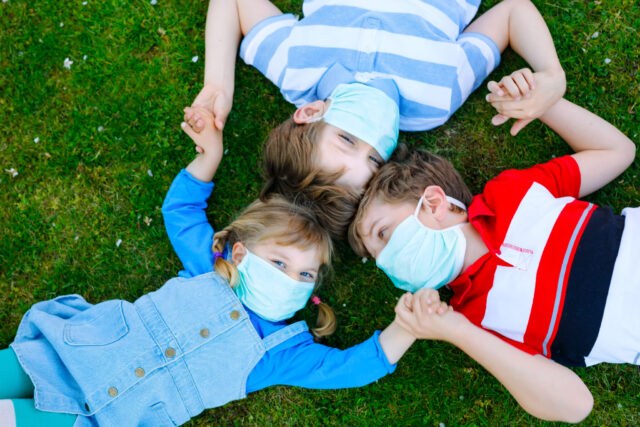How To Talk To Your Kids About COVID-19, Social Distancing and Virtual Schooling (Again)
Although your child is probably already well aware of what’s going on in the world, as the reality of them not returning to school this fall begins to sink in, they might once again look to you for answers and explanations as to why. We know this can be difficult, especially because many of us are still processing the repercussions of this “new normal” ourselves.
So, if you find yourself struggling with finding the right words to say, here are some simple and age-appropriate ways to explain why continued social distancing means continued virtual schooling.
Elementary School Kids
When it comes to talking to younger kids about coronavirus, it is crucial to remain calm and confident. Young children are particularly sensitive to seeing their parents in distress, so if you come across as panicked, they may follow suit. Instead, find a time in which you and your child feel relaxed to initiate the conversation but don’t force them to talk about anything that they are not yet ready to or interested in comprehending.
If your child starts showing signs of interest or curiosity about COVID-19 or why they still have to stay home with mommy and daddy, be sure to share some age-appropriate facts about COVID-19 and correct any misconceptions they may have. An essential component in having this conversation with young kids is reassuring them that they are safe while also acknowledging the uncertainty that the coronavirus has brought us all.
Focus on the fact that your child needs to continue to a social distance not because they are in imminent danger, but because they have an extra-important role as a “germ buster” that they must fulfill to help prevent others from getting sick. This approach, presented by PBS Kids, gives children a sense of power and control (like a superhero!) and will motivate them to maintain a positive attitude about their sacrifices.
Middle School Adolescents
Many adolescents already have access to tablets, smartphones, and other electronic devices, meaning they’ve likely already done their research or inadvertently seen headlines that have helped shape their opinions on the coronavirus pandemic. This outlook can range anywhere from crippling panic to complete skepticism about the severity of the situation.
Like all age groups, it is essential to meet your adolescent child where they are. If their fears are centered around themselves or someone they know contracting the virus, try discussing statistical information that emphasizes that they are safe, such as the efficacy of mask-wearing, hand-washing, and social distancing.
Suppose your child’s distress is not centered around the virus itself and is instead focused on missing school, friends, sports, and activities. In that case, it is imperative to validate these feelings while reiterating why we must continue to social distance. Share statistical information with them about high-risk populations and remind them that we all have a responsibility to make this world a safe place for everyone to live in.
But most of all, just listen. Adolescence is a highly social age-group that thrives on the company of their peers, so it is important to sympathize with them and acknowledge that staying homes is a considerable sacrifice. Give them space to grieve while gently reminding them that their sacrifice is valuable, noble, and brave.
High School Teens
Talking to your teens about coronavirus is similar to adolescents in that they have probably already formed their own opinions on the pandemic and how it is being handled. Since most teens are not always outwardly expressive with their emotions to their parents, it is critical to ask questions to check-in with your teen to better comprehend how they are processing this experience.
Try keeping the questions simple and specific to them, like “what are your biggest concerns about homeschooling?” or “do you know anyone who has been diagnosed with the virus?” to usher in a conversation that isn’t forced and doesn’t feel like they’re being lectured and scolded.
Remember: Your teen had big hopes and dreams for their high school experience, so it is vital that you listen to them and validate their feelings. But it is also imperative to gently remind them that their sacrifice will save lives and ultimately lead to a quicker return to normalcy.
But most of all, you will probably need to tap into your own inner teen-angst and talk about how much it sucks. This doesn’t mean spreading misinformation or minimizing the severity of the situation, but instead, simply relating to their discontentment. I can confidently assure you, this is what the naturally selfish (hey- it is developmental!) teenage brain is most interested in discussing.
Just because social distancing is the right thing to do doesn’t mean we have to love it. It’s okay to talk about how and why it sucks and sympathize with them by discussing how you are eager for it to be over as well. Your teen will appreciate you allowing them to be seen and heard instead of being scolded or lectured for not being enthusiastic about the process.

